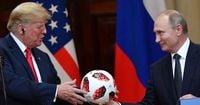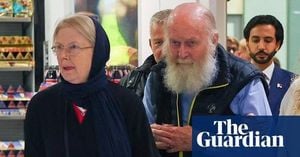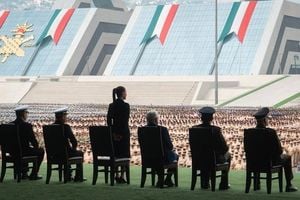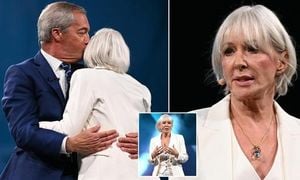U.S. President Donald Trump has hinted at a potential meeting with Russian President Vladimir Putin during his upcoming visit to Saudi Arabia in mid-May 2025. This announcement comes amid ongoing discussions about the conflict in Ukraine and the need for dialogue between the two nations.
During a press conference, Trump was asked whether he intended to meet with Putin while in the Middle East. He responded, “I don’t know, we have to consider. I haven’t thought about it. We’ll be heading to Saudi Arabia soon.” This statement reflects the uncertainty surrounding the possibility of a summit, which would be significant given the current geopolitical climate.
On March 18, 2025, Trump and Putin had a phone conversation where they discussed a proposed 30-day ceasefire in Ukraine, alongside conditions to prevent further escalation of the conflict. Notably, during this call, Putin agreed to the proposal to avoid attacks on energy infrastructure, a critical aspect of the ongoing tensions in the region.
Steve Witkoff, a special envoy from the U.S., has reportedly met with Putin at least twice in the past two months, indicating that diplomatic communications are ongoing. The Kremlin has expressed support for a meeting, with spokesperson Dmitry Peskov stating on May 5, 2025, that such a summit is necessary but requires thorough preparation. “We believe that a meeting is certainly necessary. It must be prepared properly, which requires efforts at various levels,” Peskov noted.
Trump’s Middle East trip is scheduled from May 13 to May 16, 2025, during which he will participate in a Gulf Cooperation Council (GCC) summit in Saudi Arabia, followed by visits to Qatar and the United Arab Emirates (UAE). This trip marks a significant diplomatic effort by the Trump administration to engage with Middle Eastern leaders and address regional stability.
Despite the Kremlin’s openness to discussions, Peskov clarified that there are currently no concrete plans for a meeting between the two leaders in Saudi Arabia. He emphasized the need for continued dialogue between Moscow and Washington, which has been initiated and is ongoing.
In the backdrop of these developments, Trump has voiced optimism regarding the potential for resolving the Ukraine crisis. “I think Russia is ready. I think we have an agreement with Russia. We need to reach an agreement with President Zelensky. I think it could be easier to resolve with him. So far, things have been difficult, but that’s okay,” Trump stated during the press conference.
Trump’s remarks come at a time when Western nations have imposed sanctions on Russia, leading to strained relations. However, the Kremlin has maintained that its economy is resilient, even showing signs of growth. Peskov reiterated that Russia is open to maintaining mutually beneficial relationships with all countries, including Germany, which is set to see a new government take office soon.
As tensions continue to simmer over Ukraine, the potential for a Trump-Putin meeting raises questions about the future of U.S.-Russia relations and the international response to the ongoing conflict. The last summit between the U.S. and Russia took place in Geneva in June 2021, during the administration of former President Joe Biden, marking a significant gap in direct high-level dialogue between the two nations.
While the possibility of a meeting remains uncertain, the dialogue between Trump and Putin, facilitated by their respective envoys, suggests that both sides are keen to explore avenues for de-escalation. The upcoming trip to Saudi Arabia could serve as a pivotal moment in shaping the future of their interactions.
As the world watches closely, many are hopeful that renewed discussions could lead to a breakthrough in the ongoing conflict and restore some level of stability to the region. The implications of such a meeting could resonate beyond the immediate concerns of Ukraine, potentially impacting broader geopolitical dynamics.
In summary, the potential meeting between Trump and Putin in Saudi Arabia is emblematic of the complex interplay of diplomacy in a time of crisis. With both leaders expressing a willingness to engage, the international community remains cautiously optimistic about the outcomes of their discussions.




